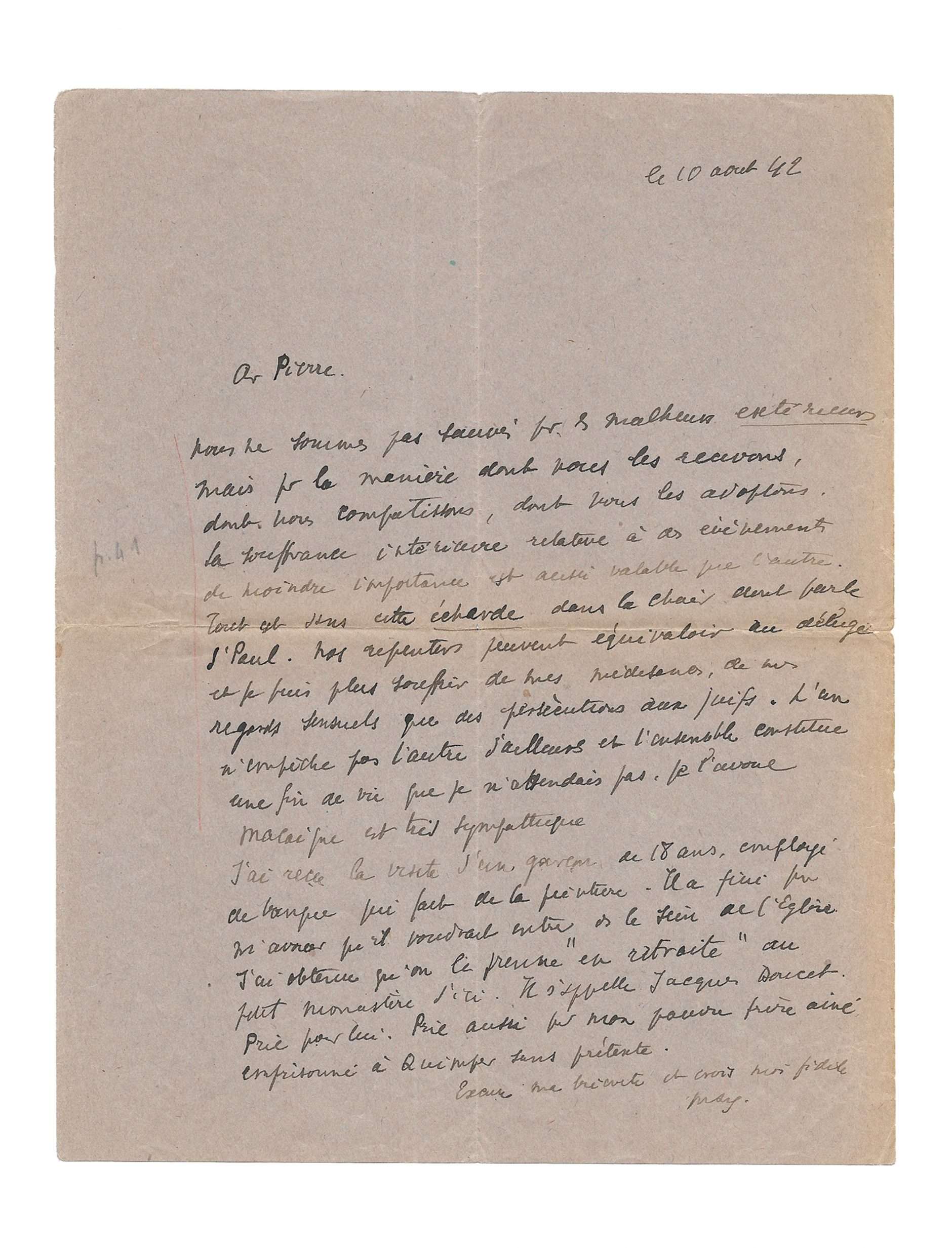JACOB, Max (1876-1944)
Autograph letter signed « Max » to Pierre Lagarde
[St Benoît sur Loire], 10th August [19]42, 1 p. in-4°
« I can suffer more from my gossip, my sensual glances, than from the persecution of the Jews »
Fact sheet
JACOB, Max (1876-1944)
Autograph letter signed « Max » to Pierre Lagarde
[St Benoît sur Loire], 10th August [19]42, 1 p. in-4°
Period fold marks, slight browning on central fold and right hand margin, tiny tears, typographical notes
Important letter from the poet giving his thoughts on the persecution of the Jews under the occupation
« Cher Pierre,
Nous ne sommes pas sauvés par les malheurs extérieurs mais par la manière dont nous les recevons, dont nous compatissons, dont nous les adoptons. La souffrance intérieure relative à des événements de moindre importance est aussi valable que l’autre. Tout est dans cette écharde dans la chair dont parle St Paul. Nos repentirs peuvent équivaloir au déluge, et je puis plus souffrir de mes médisances, de mes regards sensuels que des persécutions aux juifs. L’un n’empêche pas l’autre d’ailleurs et l’ensemble constitue une fin de vie que je n’attendais pas […]
J’ai reçu la visite d’un garçon de 18 ans, employé de banque qui fait de la peinture. Il a fini par m’avouer qu’il voudrait entrer dans le sein de l’Église. J’ai obtenu qu’on le prenne “en retraite” au petit monastère d’ici. Il s’appelle Jacques Doucet1 . Prie pour lui. Prie aussi pour mon pauvre frère aîné emprisonné à Quimper sans prétexte2.
Excuse ma brièveté et crois moi fidèle
Max »
1- The painter of lyrical abstraction Jacques Doucet (1924-1994), co-founder and member of the CoBra 1948 movement and a close friend of Max Jacob.
2- Gaston Jacob, Max’s older brother, was arrested in 1942 in Quimper. He died in deportation to Auschwitz the following year.
A central figure of the Montmartre and Montparnassian avant-garde, who converted to Catholicism in 1915 after having had several visions, Max Jacob left Paris in 1936 to settle in Saint-Benoît-sur-Loire in the Loiret region. He led a monastic life there. His poetic and mediating works, partly taken up by Pierre Lagarde in his admirable work Max Jacob – Mystique et martyr (La Baudinière, 1944), are close to the quietist current. From then on, he assumed his life as a fisherman as a condition of his redemption. Six months before the liberation of Paris, he was arrested by the Gestapo because of his Jewish origins, a fate he accepted as a martyr. He was interned by the French gendarmerie at the Drancy camp and died there five days later, a few hours before his scheduled deportation to Auschwitz.
Provenance:
Pierre Lagarde’s archives
Then private collection, Christie’s, 14 Dec. 2023, n°109
Bibliographie :
Max Jacob – Mystique et martyr, éd. Pierre Lagarde, La Baudinière, 1944, p. 41 (partially transcribed)
